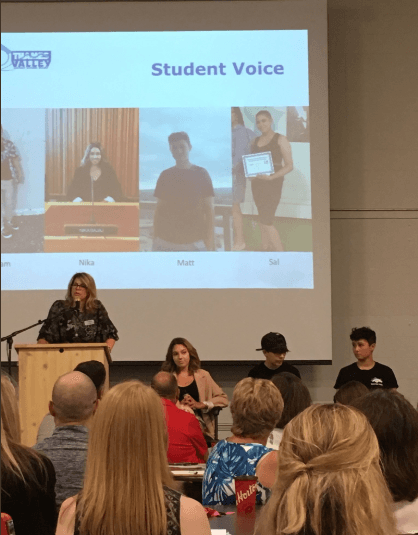 I recently had the opportunity to listen to a student panel of four remarkable students. They shared some of their personal stories in the context of the complex and exciting work of equity. Each student described their path/struggles at school and a staff member who made a positive impact in their life. Their stories helped to frame the WHY behind our need to create safe and equitable spaces in our schools and reminded us of WHO is in front of the daily decisions we make as school and system administrators. The students’ honest and optimistic messages highlighted that the actions of educators, both large and small, have impact. In fact, the impact they had in the room that morning was almost palpable. I personally left the meeting feeling incredibly optimistic about work of equity and inclusion in my role.
I recently had the opportunity to listen to a student panel of four remarkable students. They shared some of their personal stories in the context of the complex and exciting work of equity. Each student described their path/struggles at school and a staff member who made a positive impact in their life. Their stories helped to frame the WHY behind our need to create safe and equitable spaces in our schools and reminded us of WHO is in front of the daily decisions we make as school and system administrators. The students’ honest and optimistic messages highlighted that the actions of educators, both large and small, have impact. In fact, the impact they had in the room that morning was almost palpable. I personally left the meeting feeling incredibly optimistic about work of equity and inclusion in my role.
This opportunity left me reflecting on the power of student voice. Student voice is so incredibly impactful yet, after listening to the student panel, I considered that there are more ways that I could use student voice effectively in my role. Often, student voice is heard with good intentions but converting their words into meaningful actions is where there is much room for growth. Our realities often get in the way and daily actions are impacted by mood, bias, multiple demands for time, urgent needs, deadlines, events from our personal lives, quality of sleep or even the weather to name a few.
How can we keep students and their ideas at the centre of the decisions we make? There is no doubt that many things will influence our actions but there are ways to keep students at the forefront. Since humans are influenced by what we are most connected to, keeping students in our line of sight can help to ensure that they are at the centre of our decisions. Consider the following:
Engage in diverse student voices. Some students naturally rise to opportunities to share their voices. What about students who are not predisposed to typical leadership opportunities? These are the voices we need to hear. Educators need to support students who are underrepresented in conversations by ‘lifting up’ their voices. We need to reflect on how we draw upon the voices and realities of our students to make responsive decisions in our schools because not all voices need to be heard in the traditional sense of the word.
Connect with students regularly in different settings. As a principal it means intentionally booking time each day, even with the multiple demands for our time, to walk through the school, visit classrooms or interact with students during recess or during inter-curricular activities. So much can be learned from students during both structured and less structured times in the day.
Invite students to participate in ‘adult’ meetings where decisions are being made on their behalf. Students can be incredible agents of change. Often they do not see the barriers that adults can see and are able to solve seemingly complex problems with the most creative and often simplest solutions. Student insights are astounding and who knows better about what a student needs than the student.
Get to know students by name (and how to pronounce it correctly). Speaking to a student by name changes the dynamic entirely and often helps to create a connection that may lead to an open dialogue. If you don’t know how to pronounce a student by name, just ask.
Get to know a student’s story. Understanding who a student is and their story is one step to building a genuine con
nection. When you are connected to a student they are more likely to engage and share their voice.
See students as School Leaders. At my most recent school many assemblies, some clubs and all morning announcements were student-led. This cultivates student leadership and engages the student body in meaningful ways. Think of the traditional forms ways things are lead and how students can be incorporated more.
Be explicit about how their voices had impact. Share with students – “Here is what you said…here is what we did.” Let them know that their voices actually matter.
Surround yourself with student work. In my most recent school-based position I had a wall of the work shared with me by students. The wall was plastered with work samples as well as notes and drawing given to me by students. It was amazing the power that the rereading of a kind note can have to keep me focused on the ideas that students have shared with me through their writing.
These are just a few of the personal ways that I have stayed connected to students and plan to revisit these more frequently. I encourage others to share the ways that they stay connected to the voice of students in their daily decisions.
I began by talking about a student panel I was fortunate enough to help host. Here are some tweets from various educators in our system who were also at that event. Their responses resonated with me and confirmed again why giving students a “voice” is so very valuable to all of us here in Thames Valley.
***********************
Susan Bruyns – Principal at Sir Arthur Currie P.S. in London Ontario – TVDSB Follow Sue at @sbruyns
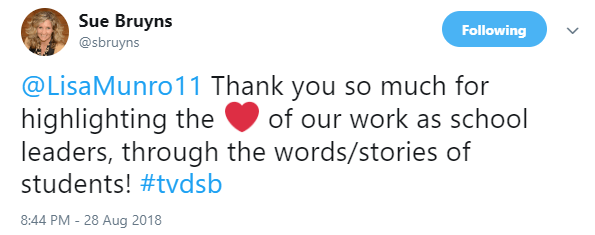
**********************
Riley Culhane – Associate Director of Education – TVDSB – Follow Riley at @RileyCulhane
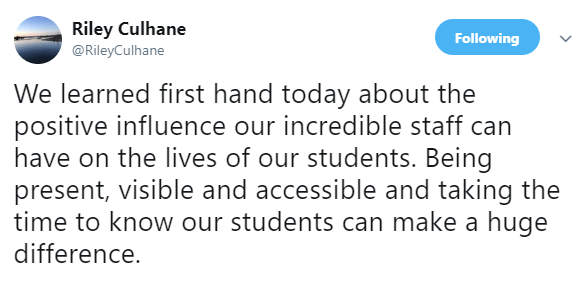
*********************
Lisa – Follow me at @LisaMunro11
 beyond expectations this year in the many situations we find ourselves. Those pivoting to online learning again when we were so hoping to stay face to face and a special thanks of appreciation to those educators in Spec Ed classes who are now face to face in situations that might cause anxiety and stress, we want to thank you. Your work for all our students, under very difficult circumstances is not going unnoticed. Thank you.
beyond expectations this year in the many situations we find ourselves. Those pivoting to online learning again when we were so hoping to stay face to face and a special thanks of appreciation to those educators in Spec Ed classes who are now face to face in situations that might cause anxiety and stress, we want to thank you. Your work for all our students, under very difficult circumstances is not going unnoticed. Thank you. reinforce the expectation for things to happen quickly, if not immediately (e.g., fast food, Amazon Prime, Google searches…).
reinforce the expectation for things to happen quickly, if not immediately (e.g., fast food, Amazon Prime, Google searches…). Drew Dudley also spoke to our system leaders recently and shared the following quote, “Leaders create moments that cause other people to feel as if they are better off for having interacted with you.” There is no doubt that the heavy lifting work of leadership leaves others and ourselves better off.
Drew Dudley also spoke to our system leaders recently and shared the following quote, “Leaders create moments that cause other people to feel as if they are better off for having interacted with you.” There is no doubt that the heavy lifting work of leadership leaves others and ourselves better off. Lots of Acceleration and Little Steering…yet – How do we Leverage Digital learning during and post Pandemic?
Lots of Acceleration and Little Steering…yet – How do we Leverage Digital learning during and post Pandemic?
 I have now been in my new role as a Superintendent of Education here in Grand Erie for just over two months. Many people have asked me about the transition, and I can truly say it has been wonderful.
I have now been in my new role as a Superintendent of Education here in Grand Erie for just over two months. Many people have asked me about the transition, and I can truly say it has been wonderful. have learned from each past interaction and individual, using these insights to have a positive impact on student achievement and well being. Having different experiences in my educational journey has confirmed for me, over and over again, that there are many facets of the education system to learn about, often in ways that I had not anticipated. And that is why learning together as a team is vital.
have learned from each past interaction and individual, using these insights to have a positive impact on student achievement and well being. Having different experiences in my educational journey has confirmed for me, over and over again, that there are many facets of the education system to learn about, often in ways that I had not anticipated. And that is why learning together as a team is vital. So, let’s start the conversation. In my experience working at the system level, I find that staff (whether Board staff, school staff or the various support staff) truly want to make decisions relevant to students, educators, schools and families. For example, the recent rolling out of the Parent Portal across the district provides a single digital access point for families and ensures the safety and privacy of student information. That decision was a team decision and it took many different personnel to make it happen. #workingtogether
So, let’s start the conversation. In my experience working at the system level, I find that staff (whether Board staff, school staff or the various support staff) truly want to make decisions relevant to students, educators, schools and families. For example, the recent rolling out of the Parent Portal across the district provides a single digital access point for families and ensures the safety and privacy of student information. That decision was a team decision and it took many different personnel to make it happen. #workingtogether I recently had the opportunity to listen to a student panel of four remarkable students. They shared some of their personal stories in the context of the complex and exciting work of equity. Each student described their path/struggles at school and a staff member who made a positive impact in their life. Their stories helped to frame the WHY behind our need to create safe and equitable spaces in our schools and reminded us of WHO is in front of the daily decisions we make as school and system administrators. The students’ honest and optimistic messages highlighted that the actions of educators, both large and small, have impact. In fact, the impact they had in the room that morning was almost palpable. I personally left the meeting feeling incredibly optimistic about work of equity and inclusion in my role.
I recently had the opportunity to listen to a student panel of four remarkable students. They shared some of their personal stories in the context of the complex and exciting work of equity. Each student described their path/struggles at school and a staff member who made a positive impact in their life. Their stories helped to frame the WHY behind our need to create safe and equitable spaces in our schools and reminded us of WHO is in front of the daily decisions we make as school and system administrators. The students’ honest and optimistic messages highlighted that the actions of educators, both large and small, have impact. In fact, the impact they had in the room that morning was almost palpable. I personally left the meeting feeling incredibly optimistic about work of equity and inclusion in my role.


 I recently read
I recently read 


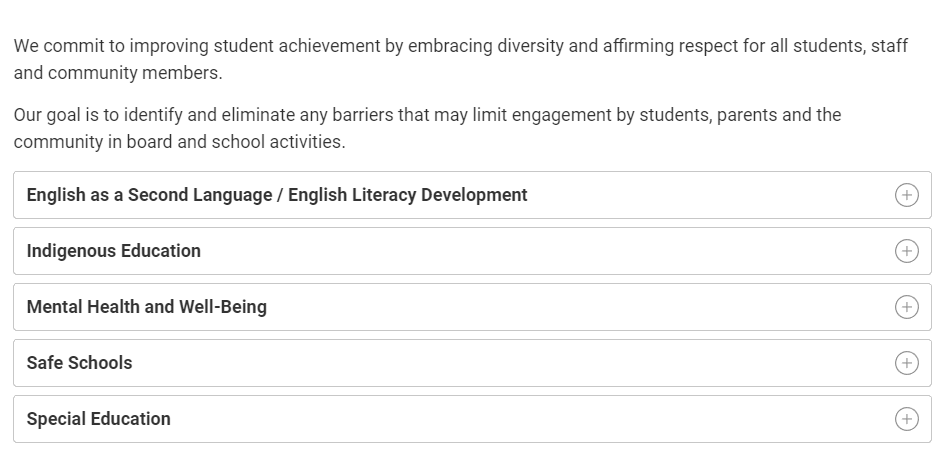



 September presents educators with an eager anticipation for new beginnings and a sense of hope for limitless possibilities that lie ahead; for students – a hope in attaining their loftiest learning goals; for educators – a desire to unleash students’ fullest potential and for administrators – to empower their school communities to engage in cycles of continuous improvement.
September presents educators with an eager anticipation for new beginnings and a sense of hope for limitless possibilities that lie ahead; for students – a hope in attaining their loftiest learning goals; for educators – a desire to unleash students’ fullest potential and for administrators – to empower their school communities to engage in cycles of continuous improvement.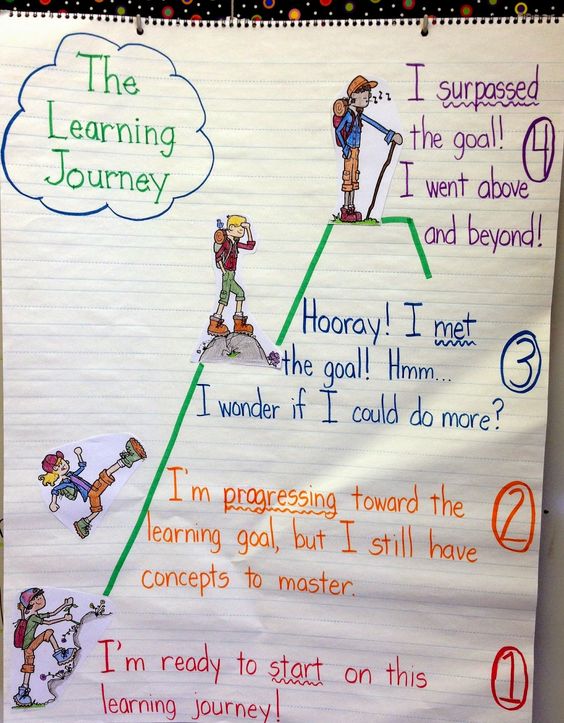 example, how challenging it would be going from a position of being a knowledgeable other to one who is almost exclusively the recipient of new knowledge. I do not struggle with not knowing everything. In fact, I have always prided myself on recognizing that I have much to learn, but the steep learning curve of a new role can have the potential to make one’s confidence wane. The uncertainties I am experiencing are bringing me out of my comfort zone but in ways that leave me inspired to challenge myself. It is my hope that the skill set and attitude that has brought me to this point in my learning journey will continue to help me be successful in my new role and to apply my own fresh lens to each situation to which I am presented. I remind myself to hold onto my long held belief that mindset is crucial to success in any role and that new challenges are meant to be embraced!
example, how challenging it would be going from a position of being a knowledgeable other to one who is almost exclusively the recipient of new knowledge. I do not struggle with not knowing everything. In fact, I have always prided myself on recognizing that I have much to learn, but the steep learning curve of a new role can have the potential to make one’s confidence wane. The uncertainties I am experiencing are bringing me out of my comfort zone but in ways that leave me inspired to challenge myself. It is my hope that the skill set and attitude that has brought me to this point in my learning journey will continue to help me be successful in my new role and to apply my own fresh lens to each situation to which I am presented. I remind myself to hold onto my long held belief that mindset is crucial to success in any role and that new challenges are meant to be embraced! Consider two scenarios for investing money. In the first scenario the investor shares that, after a series of exchanges with your money, your investment will diminish. Conversely, in a second scenario the investor shares that, after a series of different exchanges with your money, your investment will multiply. If given a choice most people would choose the latter scenario. Consider now that certain interactions with people can have similar outcomes as the scenarios above. Some interactions help people flourish while other types of interactions may cause people to feel inadequate and incapable. My recent reading of an inspiring book called “The Multiplier Effect” explains the practices that multiply or diminish the potential of those you lead. I read this book with an initial focus on school leadership, but immediately drew many connections to parent and educator interactions with students.
Consider two scenarios for investing money. In the first scenario the investor shares that, after a series of exchanges with your money, your investment will diminish. Conversely, in a second scenario the investor shares that, after a series of different exchanges with your money, your investment will multiply. If given a choice most people would choose the latter scenario. Consider now that certain interactions with people can have similar outcomes as the scenarios above. Some interactions help people flourish while other types of interactions may cause people to feel inadequate and incapable. My recent reading of an inspiring book called “The Multiplier Effect” explains the practices that multiply or diminish the potential of those you lead. I read this book with an initial focus on school leadership, but immediately drew many connections to parent and educator interactions with students. their thinking. Or, we can show children how much we know by doing all of the thinking for them.
their thinking. Or, we can show children how much we know by doing all of the thinking for them.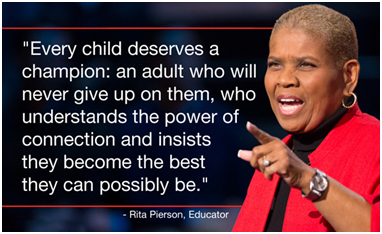 Think of a coach or group leader in your child’s life. Now imagine that, during each practice or performance, the only feedback the coach ever gave was, “Good job,” or “Not so good.” Would that help your child improve? Obviously not. A great coach provides timely feedback, during or immediately after a performance. A great coach shares information with the child about what he/she does well and can improve upon. The feedback to the child is clear, specific, timely and meaningful (e.g. “I liked the way you were in ready position. Next time, you need be out in front of the net for the pass.”). Great teaching and great coaching have a lot in common. Like great coaches, great teachers are committed to ensuring your child reaches their fullest potential. One way a teacher does this is by providing feedback daily, both formally and informally through conversations, questions, discussions, observations, student work, performances (and so much more).
Think of a coach or group leader in your child’s life. Now imagine that, during each practice or performance, the only feedback the coach ever gave was, “Good job,” or “Not so good.” Would that help your child improve? Obviously not. A great coach provides timely feedback, during or immediately after a performance. A great coach shares information with the child about what he/she does well and can improve upon. The feedback to the child is clear, specific, timely and meaningful (e.g. “I liked the way you were in ready position. Next time, you need be out in front of the net for the pass.”). Great teaching and great coaching have a lot in common. Like great coaches, great teachers are committed to ensuring your child reaches their fullest potential. One way a teacher does this is by providing feedback daily, both formally and informally through conversations, questions, discussions, observations, student work, performances (and so much more). to students so that they understand what they have done well and what they need to do next has a more powerful impact on going forward with learning than just knowing a mark or grade.
to students so that they understand what they have done well and what they need to do next has a more powerful impact on going forward with learning than just knowing a mark or grade.